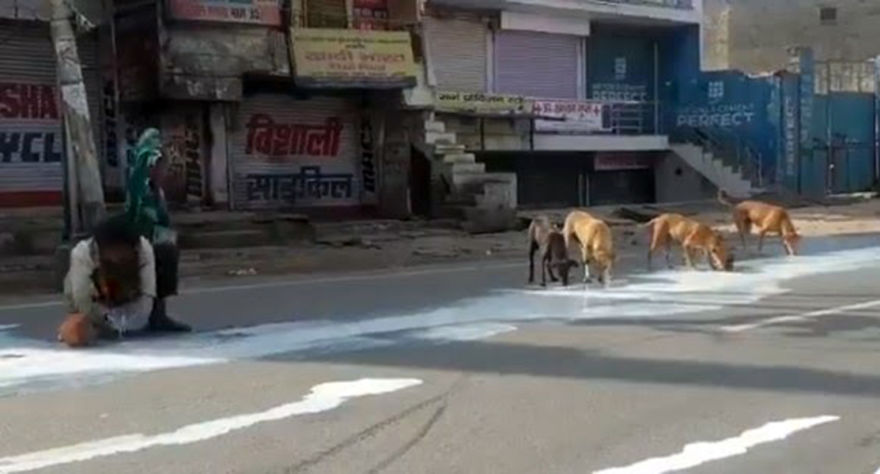A Man Gathers Spilled Milk As Dogs Also Drink Nearby – The Impact Of Corona Virus
469views
We’ve seen the video of the homeless man in India, gathering milk from the ground with his bare hands, trying to save it to a container as street dogs lap it from nearby.
The world has been impacted by Coronavirus (COVID-19) in ways that have exacerbated and shined a light on the systemic problems with poverty and classicism around the world.
Homelessness and poverty are being proven to impact us all in ways we’d never considered before and the world sees the need to do better.
Never has the gap between the poor and the wealthy of the world been more widely visible. Even in nations such as the United States, the poor are standing in lines for six or more hours for food distribution, denied virus testing on the grounds that they are not available, while they see the wealthy able to stay home, get tested on a whim, and not need to go out and subject themselves to potentially becoming infected.
COVID-19 Fact and Fiction
Can you get the virus from sharing space with others? Is it airborne? Can you get it from your dog or your other pets? Can they give it to each other? There are many questions about COVID-19 and the facts change regularly. Here are the things that we know and what is in question still.
Can I get it from my dog?
So far, this hasn’t happened and there is no evidence that it can happen. There have been cases of dogs that have gotten the virus from their owners and it seems to be milder in them. In these particular cases, it is believed that the dogs likely licked the faces or hands of their own and got the virus in this manner. For now, there is no need to panic that the dog can give it to another human, this has not happened that anyone is aware of.
Can I breathe air that has the virus in it and get the virus?
Yes. This has been confirmed to be a disease that is transmitted when it is aerosolized by someone speaking, sneezing, breathing hard (think jogger), or coughing into the air. The virus may stay in the air for a long time. It is believed that it can also be passed in shared central air conditioning units and this may be why it has ravaged through nursing home environments.
This is why wearing a mask over your nose and mouth is helpful, even if the virus can pass through it. When both people that come into a close range of each are wearing a mask, passing the virus is greatly reduced when both are wearing a mask. If only one is wearing a mask, the odds go up slightly, When both are without a mask, the odds are drastically increased that both are exposed if the other person has the virus.
How long can the virus remain on a surface?
This is still not exactly known. It is dependent on the surface. It appears that the virus doesn’t live on porous surfaces as long as it has something like stainless steel. As few as five minutes in the direct sunlight can kill the virus, but any part of it that remains in the shadows, such as the underside of a table or chair, will allow the virus to live for many hours, perhaps up to 24 hours.
The bottom line is that those who are poor and don’t have access to water and soap are most at risk. Those who live on the street and cannot take shelter are at risk. Those who are elderly, with other health conditions may succumb to the virus faster than those in relatively good health. That said, many people of all age groups, even children, are dying from COVID.
There is no arguing that the people most at risk are in the categories of minority and disenfranchised. Those with no access to washing facilities and shelter, no healthcare, and no facemask are far at greater risk. Countries with many street people and poor classes of people in these types of circumstances will experience higher rates of infection and death. Until we help the poor, we are unable to help ourselves beat this disease.
Lastly, don’t fear your dog but be cautious to wash your hands, change clothes, and wear a mask when you are out of the home. Come home and wash, shower, and change clothing before you touch your dog and this will also help to not give it to him. You should be in no danger of catching anything from your dog. There is no reason to fear your dog or need to rehome him. Please, don’t do that. He’s a member of your family too.
Read More:
https://www.boredpanda.com/illustration-coronavirus-reflections-tyh-tang-yau-hoong/
https://www.boredpanda.com/illustrations-covid-19-alphabet-popular-topics-doodle-bhai/
We’ve seen the video of the homeless man in India, gathering milk from the ground with his bare hands, trying to save it to a container as street dogs lap it from nearby.
The world has been impacted by Coronavirus (COVID-19) in ways that have exacerbated and shined a light on the systemic problems with poverty and classicism around the world.
Homelessness and poverty are being proven to impact us all in ways we’d never considered before and the world sees the need to do better.
Never has the gap between the poor and the wealthy of the world been more widely visible. Even in nations such as the United States, the poor are standing in lines for six or more hours for food distribution, denied virus testing on the grounds that they are not available, while they see the wealthy able to stay home, get tested on a whim, and not need to go out and subject themselves to potentially becoming infected.
COVID-19 Fact and Fiction
Can you get the virus from sharing space with others? Is it airborne? Can you get it from your dog or your other pets? Can they give it to each other? There are many questions about COVID-19 and the facts change regularly. Here are the things that we know and what is in question still.
Can I get it from my dog?
So far, this hasn’t happened and there is no evidence that it can happen. There have been cases of dogs that have gotten the virus from their owners and it seems to be milder in them. In these particular cases, it is believed that the dogs likely licked the faces or hands of their own and got the virus in this manner. For now, there is no need to panic that the dog can give it to another human, this has not happened that anyone is aware of.
Can I breathe air that has the virus in it and get the virus?
Yes. This has been confirmed to be a disease that is transmitted when it is aerosolized by someone speaking, sneezing, breathing hard (think jogger), or coughing into the air. The virus may stay in the air for a long time. It is believed that it can also be passed in shared central air conditioning units and this may be why it has ravaged through nursing home environments.
This is why wearing a mask over your nose and mouth is helpful, even if the virus can pass through it. When both people that come into a close range of each are wearing a mask, passing the virus is greatly reduced when both are wearing a mask. If only one is wearing a mask, the odds go up slightly, When both are without a mask, the odds are drastically increased that both are exposed if the other person has the virus.
How long can the virus remain on a surface?
This is still not exactly known. It is dependent on the surface. It appears that the virus doesn’t live on porous surfaces as long as it has something like stainless steel. As few as five minutes in the direct sunlight can kill the virus, but any part of it that remains in the shadows, such as the underside of a table or chair, will allow the virus to live for many hours, perhaps up to 24 hours.
The bottom line is that those who are poor and don’t have access to water and soap are most at risk. Those who live on the street and cannot take shelter are at risk. Those who are elderly, with other health conditions may succumb to the virus faster than those in relatively good health. That said, many people of all age groups, even children, are dying from COVID.
There is no arguing that the people most at risk are in the categories of minority and disenfranchised. Those with no access to washing facilities and shelter, no healthcare, and no facemask are far at greater risk. Countries with many street people and poor classes of people in these types of circumstances will experience higher rates of infection and death. Until we help the poor, we are unable to help ourselves beat this disease.
Lastly, don’t fear your dog but be cautious to wash your hands, change clothes, and wear a mask when you are out of the home. Come home and wash, shower, and change clothing before you touch your dog and this will also help to not give it to him. You should be in no danger of catching anything from your dog. There is no reason to fear your dog or need to rehome him. Please, don’t do that. He’s a member of your family too.
Read More:
https://www.boredpanda.com/illustration-coronavirus-reflections-tyh-tang-yau-hoong/
https://www.boredpanda.com/illustrations-covid-19-alphabet-popular-topics-doodle-bhai/
469views
Share on Facebook




2
0